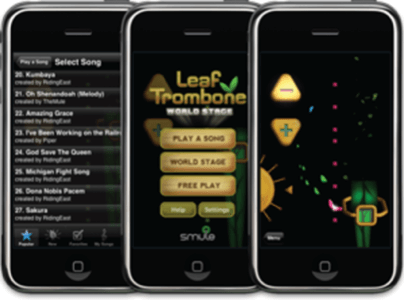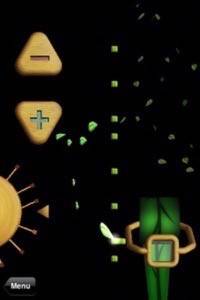iPhone musical application developer Smule made a name for itself when it released its Zelda-inspired Ocarina software last year to great fanfare. Boasting a simple (yet surprisingly difficult to master) interface consisting of 4 note pads (simulated finger holes), the software combined multi-touch and breath detection to make the iPhone into a very playable instrument similar to a real ocarina.

Today, Smule announced the latest and most ambitious of their iPhone/iPod Touch-based instrument apps, Leaf Trombone: World Stage. Leaf Trombone improves upon the shortcomings of Ocarina in a number of areas (like adding tutorials), and throws in a very ambitious online judgment area called World Stage.
Leaf Trombone
The way Leaf Trombone is controlled is quite different from Ocarina. Instead of a recorder-like set of holes to cover, you are presented with a slider (a leaf) on the right and an octave controller on the left. Tick-marks along the leaf indicate major notes. Playing is as simple as tapping or sliding along the leaf to produce a sound. Holding one of the two triangles will, of course, shift the notes up or down an octave. There is also a setting to turn on breath control, in case you want to emulate a real trombone a little more closely.

The instrument encourages you to produce a real melody. To that end there is a tutorial mode you can engage to watch a rendition of any of the songs from the game library or new compositions from other Leaf Trombone contributors. Both while watching or playing a song, a Dance Dance Revolution-style scrolling display of leaves indicates the notes to be played for the upcoming 10 seconds or so. By dutifully following the leaves as they touch the tick marks, songs can quickly be mastered.
World Stage
After some practice, you may want to conduct a performance on the World Stage. This is a special mode where the software connects to the Smule game server and lets you play for a panel of 3 judges. Before you can do that, though, you first have to judge a performance or two. After registration, you indicate your willingness to judge and the server assigns you plus two other judges to a performance. During the performance, you can choose an animated emoticon to indicate how you think the solo is going. You can also type in a short message either during or after the performance. Once it is finished, you assign a numerical rating and you will get leaves which allow you to then perform.

Once you have some leaves, you can choose a song and play a song to be judged. Your performance will be rated, and then stored under the World Stage ID that you created, and assigned a star rating. As more people find and rate your solo, the number of stars that you get may go up or down. Also, as you perform more songs that are rated highly, your overall ranking on the global ladder will rise.
Finally, there are a number of unlockable achievements you can work toward both for performing and judging that should keep you challenged for many hours to get them all.
Minor Quibbles
There are a couple of minor points we can’t help but touch on. First, we unfortunately have to agree with Techcrunch and wonder why the trombone is the only instrument sound that’s offered. It would be nice to be able to choose a different instrument sound perhaps, to make our recitals unique. Second, we think the slider could support more advanced polyphony, perhaps limited to two or three notes maximum, in order for people who have already mastered the single-note songs to still find a challenge on the World Stage.
Overall, Leaf Trombone: World Stage (iTunes link) hits all the right notes in terms of an instrument application that is fun, easy to pick up and with incentives to keep playing with the challenging World Stage. The graphics are unique without being distracting, and the World Stage area has a great 3D globe that indicates where other judges and performers are in the world. Listening to other performances and judging went very smoothly. Especially for the introductory price of a single dollar, we can easily recommend this fun application.


















